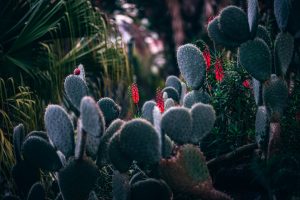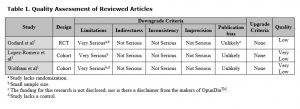The Effects of Opuntia (Cactaceae) on Lowering Postprandial Blood Glucose
Abstract
Background: The rise of chronic diseases such as diabetes, cardiovascular disease, and obesity has become a great concern in the medical community. Incorporating Opuntia into people’s diets may allow patients a natural alternative to supplement traditional medicine in order to combat these diseases. The purpose of this review is to investigate the effect of Opuntia on postprandial glucose levels.
Methods: A comprehensive search of online medical literature was performed using MEDLINE-PubMed, EBMR Multifile, and CINAHL. Keywords used included: prickly pear, nopal, Opuntia, and diabetes. Inclusion criteria required human studies, studies published in the English language, and studies within the last 15 years.
Results: Three articles met eligibility criteria. Two of the articles were cohort studies while one of the studies was a randomized control trial. There are consistent results regarding a significant decrease in postprandial insulin and blood glucose levels. The overall quality of the studies is low due to some limitations (see Table I). Further studies are needed to address these limitations, and improve the quality of evidence in regards to the effects of Opuntia on postprandial blood glucose.
Conclusion: Studies investigating the effects of Opuntia on postprandial glucose levels show promising results of safely lowering postprandial blood glucose and insulin levels acutely. However, more research is needed with larger randomized controlled studies to provide additional evidence to support these results. Additional research is also needed to determine the long-term effects of Opuntia, and its capability to complement and potentially replace traditional hypoglycemic medications. Until then, medical providers can discuss Opuntia’s natural hypoglycemic effects with patients to help reduce progression of chronic disease.
Keywords: Prickly pear, nopal, Opuntia, postprandial, diabetes.
(Click on image to enlarge.)
REVIEWED STUDIES:
Godard MP, Ewing BA, Pischel I, Ziegler A, Benedek B, Feistel B. Acute blood glucose lowering effects and long-term safety of OpunDia™ supplementation in pre-diabetic males and females. J Ethnopharmacol. 2010;130:631-634.
Lopez-Romero P, Pichardo-Ontiveros E, Avila-Nava A, et al. The effect of nopal (Opuntia ficus indica) on postprandial blood glucose, incretins, and antioxidant activity in Mexican patients with type 2 diabetes after consumption of two different composition breakfasts. J Acad Nutr Diet. 2014;114:1811-1818.
Wolfram RM, Kritz H, Efthimiou Y, Stomatopoulos J, Sinzinger H. Effect of prickly pear (Opuntia robusta) on glucose- and lipid-metabolism in non-diabetics with hyperlipidemia–a pilot study. Wien Klin Wochenschr. 2002;114:840-846.
AUTHORS: Megan Aaseby is currently completing her second year in the School of PA Studies at Pacific University, Oregon. She will graduate with an MS degree in August 2017.



No Comments Yet